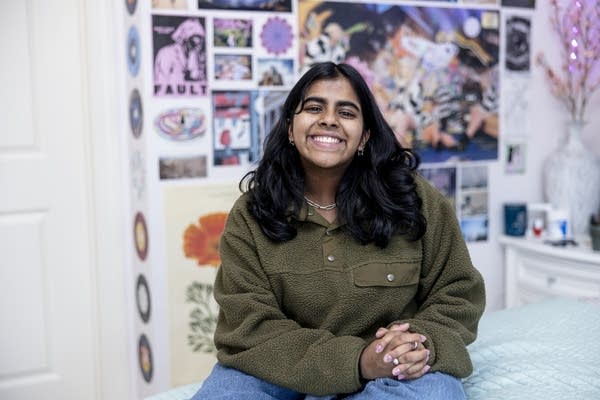Difference maker Deepti Pillai: ‘The way change happens is conversations’

Go Deeper.
Create an account or log in to save stories.
Like this?
Thanks for liking this story! We have added it to a list of your favorite stories.
Deepti Pillai was 14 years old in 2020 when George Floyd was killed. She saw her classmates speaking out about racism and decided to join MCEE, a student-led organization focused on equity in the Minnetonka school district.
Working on equity felt to her like moving toward a solution for problems she hadn’t ever had words for.
“In 2020, after everything had happened, there was this emergence of an explanation to things. I was seeing all of these other people that were angry and hearing their stories and hearing their situations and I was like, I’ve been attending this school for X amount of years and I never had a way to comprehend how I felt and I didn’t understand why it felt weird when I was the only student of color in my classroom.”
She spent time in 2020 and 2021 attending rallies, posting on social media, putting together a petition, getting people to sign it.
Turn Up Your Support
MPR News helps you turn down the noise and build shared understanding. Turn up your support for this public resource and keep trusted journalism accessible to all.
But things feel very different now. She and her fellow students are leading fewer walkouts and protests. She’s as passionate as ever about racial justice, and working to make her school more equitable. But the arsenal of tools she has for pursuing those goals has changed.
“The way change happens is conversations with administration,” Deepti said. “I’ve learned what’s effective and what’s not. Protests and rallies are best for connecting with students and the community. But they’re not good for the administration. It’s actually detrimental.”
She’s proud of the walkouts she’s participated in or helped lead, but there have been anti-racist efforts at her school that she thinks were unhelpful.
There was one in the 2020-2021 school year that she thinks got out of hand. A player on the high school basketball team called a Black student a racial slur. Deepti and others organized a sit-in to bring attention to the issue and told school administration how they wanted the incident handled.
But then an outside activist organized a protest outside the school that resulted in a lockdown. Deepti said she understood and sympathized with the rage expressed in that protest, but she wishes the protesters had better communicated about and supported the efforts she and other MCEE members were already working on.
“There were these outside organizations in Minnesota, that were very obsessed with the idea of having these very rageful protests, and with the purpose of kind of demeaning some of our administrators and shining them in a very negative light publicly,” she said.
“It was a great thing that they had so much emotion towards this. It was just a difficult situation to not have them understand kind of the effects of it, and how by doing that we didn't, they didn't progress anything and rather it was further just almost exploiting the situation, like spreading it in a way that's airing the trauma without being dedicated to genuine change or effectiveness in their actions.”
Now Deepti is less focused on walkouts than other initiatives. She and others at her organization have created a point person to help students of color with academic and safety support.
She’s helped create a student belonging committee, an anti-racism statement and equity-centered vision for the district, including training for school staff, and better incident reporting. She joined the principal’s advisory board and has helped organize a cultural fair to celebrate Minnetonka’s diverse cultures.
“It's been so much change over the last few years. And…the school culture is so different than what it used to be. There's such a different set of needs from students almost, and what they're looking for from their school and in their classrooms,” she said.
“If our educational system can change and educate their students in an equitable way — that I think is … the most correct way to enact change to our society as a whole.”
This story is part of a series produced with support from the Education Writers Association Reporting Fellowship program.


